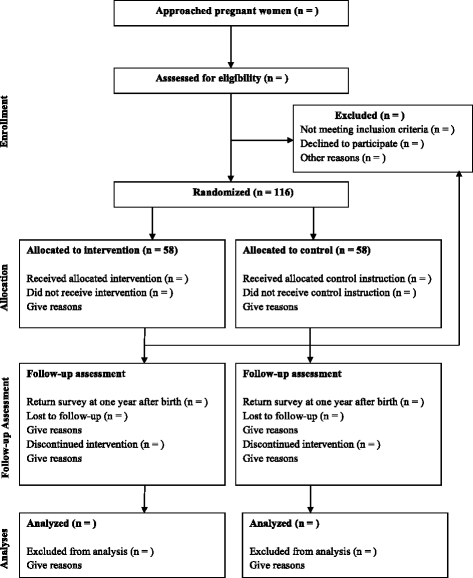Effectiveness of skin-to-skin contact versus care-as-usual in mothers and their full-term infants: study protocol for a parallel-group randomized controlled trial
- PMID: 28683833
- PMCID: PMC5501342
- DOI: 10.1186/s12887-017-0906-9
Effectiveness of skin-to-skin contact versus care-as-usual in mothers and their full-term infants: study protocol for a parallel-group randomized controlled trial
Abstract
Background: Twenty-to-forty percent of women experience postpartum depressive symptoms, which can affect both the mother and infant. In preterm infants, daily skin-to-skin contact (SSC) between the mother and her infant has been shown to decrease maternal postpartum depressive symptoms. In full-term infants, only two studies investigated SSC effects on maternal depressive symptoms and found similar results. Research in preterm infants also showed that SSC improves other mental and physical health outcomes of the mother and the infant, and improves the quality of mother-infant relationship. This randomized controlled trial will investigate the effects of a SSC intervention on maternal postpartum depressive symptoms and additional outcomes in mothers and their full-term infants. Moreover, two potential underlying mechanisms for the relation between SSC and the maternal and infant outcomes will be examined, namely maternal oxytocin concentrations and infant intestinal microbiota.
Methods/design: Design: A parallel-group randomized controlled trial.
Participants: 116 mothers and their full-term infants.
Intervention: Mothers in the SSC condition will be requested to provide daily at least one continuous hour of SSC to their infant. The intervention starts immediately after birth and lasts for 5 weeks. Mothers in the control condition will not be requested to provide SSC. Maternal and infant outcomes will be measured at 2 weeks, 5 weeks, 12 weeks and 1 year after birth.
Primary outcome: maternal postpartum depressive symptoms. Secondary maternal outcomes: mental health (anxiety, stress, traumatic stress following child birth, sleep quality), physical health (physical recovery from the delivery, health, breastfeeding, physiological stress), mother-infant relationship (mother-infant bond, quality of maternal caregiving behavior). Secondary infant outcomes: behavior (fussing and crying, sleep quality), physical health (growth and health, physiological stress), general development (regulation capacities, social-emotional capacities, language, cognitive and motor capacities). Secondary underlying mechanisms: maternal oxytocin concentrations, infant intestinal microbiota.
Discussion: As a simple and cost-effective intervention, SSC may benefit both the mother and her full-term infant in the short-and long-term. Additionally, if SSC is shown to be effective in low-risk mother-infant dyads, then thought could be given to developing programs in high-risk samples and using SSC in a preventive manner.
Trial registration: NTR5697 ; Registered on March 13, 2016.
Keywords: Full-term infants; Infant behavior; Mental health; Mother-infant relationship; Physical health; Postpartum depressive symptoms; Randomized controlled trial; Skin-to-skin contact.
Conflict of interest statement
Ethics approval and consent to participate
The trial has been approved by the ethics committee of the Social Science faculty of the Radboud University, The Netherlands (ECSW2015–2311-358). Written consent will be obtained from participants.
Consent for publication
Not applicable.
Competing interests
The authors declare that they have no competing interests.
Publisher’s Note
Springer Nature remains neutral with regard to jurisdictional claims in published maps and institutional affiliations.
Figures
References
-
- McCoy SJB, Beal JM, Shipman SM, Payton ME, Watson GH. Risk factors for postpartum depression: a retrospective investigation at 4-weeks postnatal and a review of the literature. J Am Osteopath Assoc. 2006;106:193–198. - PubMed
-
- Morris-Rush JK, Freda MC, Bernstein PS. Screening for postpartum depression in an inner city population. Am J Obstet Gynecol. 2003; doi:10.1067/mob.2003.279. - PubMed
-
- Conroy S, Pariante CM, Marks MN, Davies HA, Farrelly S, Schacht R, Moran P. Maternal psychopathology and infant development at 18 months: the impact of maternal personality disorder and depression. J Am Acad Child Adolesc Psychiatry. 2012; doi:10.1016/j.jaac.2011.10.007. - PubMed
Publication types
MeSH terms
Substances
LinkOut - more resources
Full Text Sources
Other Literature Sources
Medical
Research Materials



